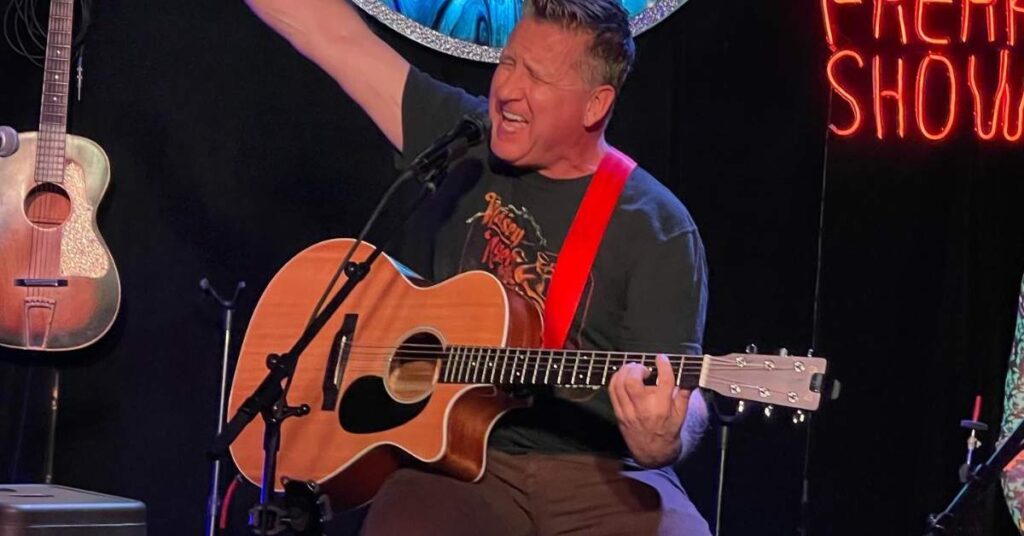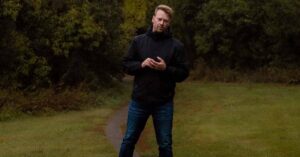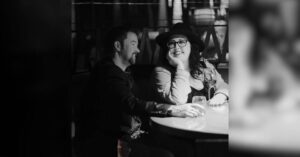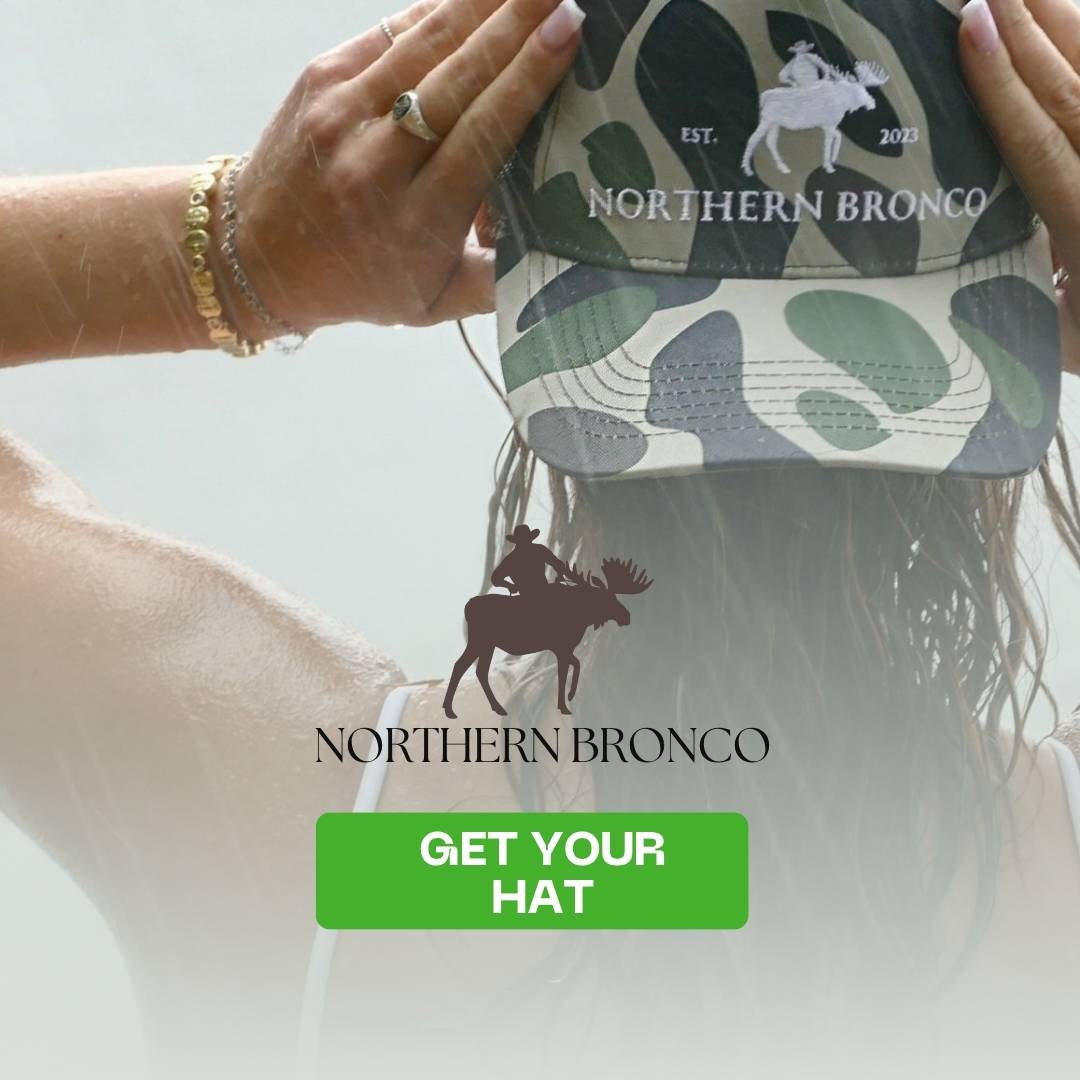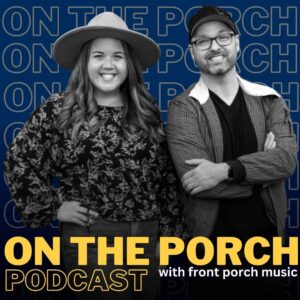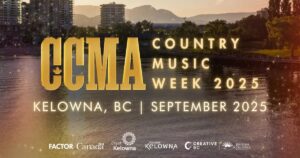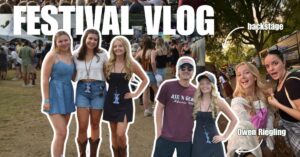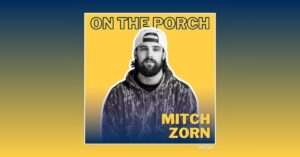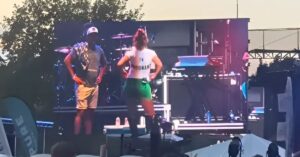“Heaven and Back” is the latest track from British Columbia-based singer-songwriter Doug Folkins.
It was released just in time to break your heart on Valentine’s Day, “Heaven and Back” is currently streaming on all music platforms, as well as seeing radio play across the country.
RELATED: Check out our coverage of “Heaven and Back” …
I had the chance to sit down with Doug and talk about his history as a professional songwriter and musician, his creative process, and how the subversive “Heaven and Back” came to be.
An Interview with Doug Folkins:
Jason: Thanks for joining me on the virtual Front Porch today!
If you can give us a rundown of who you are and where you’re from, for readers who might not already be familiar with you.
Doug: Sure.
I grew up in the Maritimes, I grew up in New Brunswick, and my hometown is a tiny little farming community called Sussex. I grew up on a farm there.
But I’ve been living on Vancouver Island since 1994. So I kind of transplanted out here after I got my degree.
I really started becoming more of a musician in the late 1990s. I started with my first solo projects, and did a sort of indie folk/indie rock thing for a bunch of years, and had some limited success there. Played overseas, got to go to some festivals, so that was a lot of fun.
And then I started writing country songs, and taking that really seriously, in the early 2000s. I kinda changed from an artist into a songwriter at that time.
I started going to Nashville, and in 2014 I got a publishing deal there. So I started making regular trips down there, two or three times a year. With that, I restarted my artist thing. You know, I’m writing all of these songs, and I really love a lot of them that aren’t getting cut. So I started putting some of them out.
I made a little EP, and slowly released some singles, and I’ve been riding a string of singles for a while.

J: Do you know if there was a moment when you realized that music could become more than a hobby for you? When it could become a career?
D: You know, I don’t know.
The word “career” is an interesting choice. I prefer to use the word “professional”. For me, it was never really as an artist, but as a songwriter, that I can certainly consider myself a professional. I treated it as a profession.
I’m very diligent at it, I’ve put in the hours in the trade, because that’s what a pro does. They get up and they write every day.
For me, that’s kind of how I manage it. I have key performance indicators and targets to meet, and I really do treat it as a profession.
So that moment came to me probably four years ago, when I started working with a life coach. And that’s really helped me put perspective on what I was doing, you know, rather than just flailing around. Using my talent and creativity, and turning that into a profession, and treating it like a professional would treat it.
That was probably the defining moment for me.
J: When you’re writing music, do you find you’re more inspired by people, or more inspired by things, or places?
D: I’m lyric first, melody second guy, you know. And I am driven by dialogue.
So my inspiration often comes from something I will have heard in a conversation, or watching a show, catching a phrase, something that inspires me to think like, “oh, that’s a clever twist, or that’s a different way to look at things” or “how I would I take what they said and twist it”.
So I really think that dialogue is the driver.
J: In terms of this single in particular, what was the writing process like?
D: This one I wrote with a couple of regulars. Patrick James Clark and Anthony Fiddler, who’s my producer. I’ve been working with them for years, but we also write a lot with other people.
I think we’re 80 or 90% of the songs that we’ve written have gotten cut. So it was in a typical two or three hour session that Patrick actually had the idea for “Heaven and Back”.
He had the title, but we really kind of beat around what the idea would mean. There are so many songs like, “I’m going through hell, and it’s crap”, but just a spin on that. It just was kind of a different, fresh perspective on a bit of a tired scene.
J: You describe this as “flipping the script” on a classic breakup song. In what way is telling that kind of story important to you? Flipping the script on those classic breakup songs?
D: I think one of the things was, why is this such an obvious title, and no one’s really written it in the country?
In country, there’s something about a turn of phrase, and there’s a cleverness that comes when you can turn a phrase and capture listeners.
So that’s what I mean by it flips the script, in the sense that it’s not exactly where you think. You think we’ve gone through hell and back, but it’s the opposite.
J: You also do a lot of co-writing, you have some tracks coming up with Bucktwenty, for example, that you helped co-write.
At what point in the writing process did you decide that “Heaven and Back” was a song for you to perform, and not someone else? Or did you always have that in mind?
D: You know, that’s a good question. I didn’t know when we wrote it that it was going to be for me.
Patrick did the work tape on this one, and he’s got a really smooth, sexy delivery. And I decided I wanted to try my own work tape with it.
When I sat down with it, I just loved the way it feels and the way it sounds, and I thought it would be something that would be really good for me. I fell in love with playing it, and that’s when I made the decision.
As you put out singles, you’re always trying to one-up the last one you did. I felt like this was talking me in that direction. You know, “6 Pack Town” was a bit of a party song, a bit of a drinking song, and I wanted to take the next one in a different direction.
RELATED: Check out our article about “6 Pack Town” …
Between that and loving to play it, I decided to record it.
J: When a listener hears this song, what do you want their takeaway to be? What do you want them to feel?
D: I think, first of all, I want them to think that sonically, it feels good. Just the overall impression of the music. It’s got that nice off-tempo drive, I want them to be interested in hearing where it goes.
And then you start hearing the story about this guy, and how he was saved by this woman. She rescued him.
So he’s holding onto the idea that you can still have reverence for someone you broke up with. You don’t need to hate them. I think that’s what I want people to take away from it.
J: I think that’s definitely a unique message in a breakup song. I think that’s kind of what you were referencing when you said it was “flipping the script”, right?
D: Yeah, exactly. It’s not that I hate you, because I still respect you. It just didn’t work out.
J: How would you define success for this single?
D: Well, I’m an independent artist. So we tend to define success differently. It’s never going to be about getting a crazy number of streams, or making it to the top.
For me, there’s a few radio stations that really support me. So success for me would be that those people continue to support me, and if I can add another three or four stations that have never played my music before, that’s fantastic.
I’m getting added to some playlists, like on Spotify, and I’m really seeing streaming numbers that I’m not used to already. So that’s a big success.
Another thing is my contemporaries texting me, messaging me about how good it sounds. They often say that a tiny voice has never sounded better, that it’s the best thing I’ve put out yet. To me, that’s the success I want.
J: Is there anything else you have going on, looking forward to the future?
D: Just carrying on putting out more I did.
I’m going back down to Nashville at some point this year for another writing trip. I’m excited about working with Haley Benedict, she’s another artist I’ve been doing a lot of writing with and she’s cut a couple of my songs. She’s out touring with Aaron Govan right now and she’s playing some of the songs we cut together, so she’s really exciting for me to work with.
Just this carrying on and being a professional. That’s what I’m excited about just doing what I do, from a writing perspective. As an artist, I’m going to continue to grow my fan base by playing lots of live shows.
J: Well, thank you so much for joining me here! I really appreciate you taking the time to talk to us here on the Front Porch.
You can keep up with Doug on his website, dougfolkins.com, and by following his socials, linked below.
Twitter: @dougfolkins
Facebook: @dougfolkinsmusic
Stream “Heaven and Back”

Jason Saunders
Jason Saunders is a graduate from both the English Literature program at Trent University and the Journalism program and Seneca College. He has a passion for music, writing, and all things creative.
- Jason Saunders#molongui-disabled-link
- Jason Saunders#molongui-disabled-link
- Jason Saunders#molongui-disabled-link
- Jason Saunders#molongui-disabled-link

